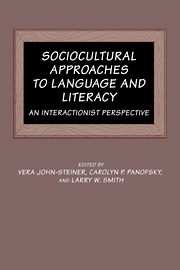Book contents
- Frontmatter
- Contents
- List of contributors
- 1 Introduction
- Part 1 Context
- Part II Mediational processes
- 5 Nonverbal factors in the interpsychic to intrapsychic internalization of objects
- 6 An ecological approach to the emergence of the lexicon: Socializing attention
- 7 Learning how to explain: The effects of mother's language on the child
- 8 Developing the representational functions of language: The role of parent–child book-reading activity
- 9 The implications of Vygotskian theory for the development of home-school programs: A focus on storybook reading
- 10 Vygotsky in the classroom: An interactionist literacy framework in mathematics
- Part III Functional systems
- Author index
- Subject index
6 - An ecological approach to the emergence of the lexicon: Socializing attention
Published online by Cambridge University Press: 05 November 2011
- Frontmatter
- Contents
- List of contributors
- 1 Introduction
- Part 1 Context
- Part II Mediational processes
- 5 Nonverbal factors in the interpsychic to intrapsychic internalization of objects
- 6 An ecological approach to the emergence of the lexicon: Socializing attention
- 7 Learning how to explain: The effects of mother's language on the child
- 8 Developing the representational functions of language: The role of parent–child book-reading activity
- 9 The implications of Vygotskian theory for the development of home-school programs: A focus on storybook reading
- 10 Vygotsky in the classroom: An interactionist literacy framework in mathematics
- Part III Functional systems
- Author index
- Subject index
Summary
Infants who are learning to talk, toddlers engaging in book-looking interactions with caregivers, and preschoolers and kindergartners have something in common. At home and at school, all are novices immersed in new and unfamiliar cultures. All of these children must come to detect patterns in what, at first, is a seamless, continuous flow of perceptual information. Events in daily life are not media constructs edited to have sharply delimited beginnings or ends. Conversation is not composed of tightly organized and self-contained sound-bites whose meaning is unambiguous. Instead, life for a novice is much more like an unedited or candid home movie whose organization and structure is not immediately transparent. Cultural meaning will be emergent, gradually detected by guided participation in ordinary activities, not by passive viewing or solitary problem-solving.
How do these infant-and child-novices gradually come to recognize/ identify, participate in, and communicate about events in either setting? We argue that novices are assisted in their development by caregivers, family members and teachers, in both settings. Caregivers talk about what is happening as events unfold. In the midst of engaging in almost any part of the daily routine, caregivers unwittingly and unceasingly transmit knowledge of cultural practices by directing young members' attention to the dynamic relations between themselves and what the environment might offer. To do anything and get it done (from eating to bathing to napping), infants must be continuously focused (and refocused) on the who, what, where, when, and why of daily doings.
- Type
- Chapter
- Information
- Sociocultural Approaches to Language and LiteracyAn Interactionist Perspective, pp. 170 - 190Publisher: Cambridge University PressPrint publication year: 1994
- 18
- Cited by



